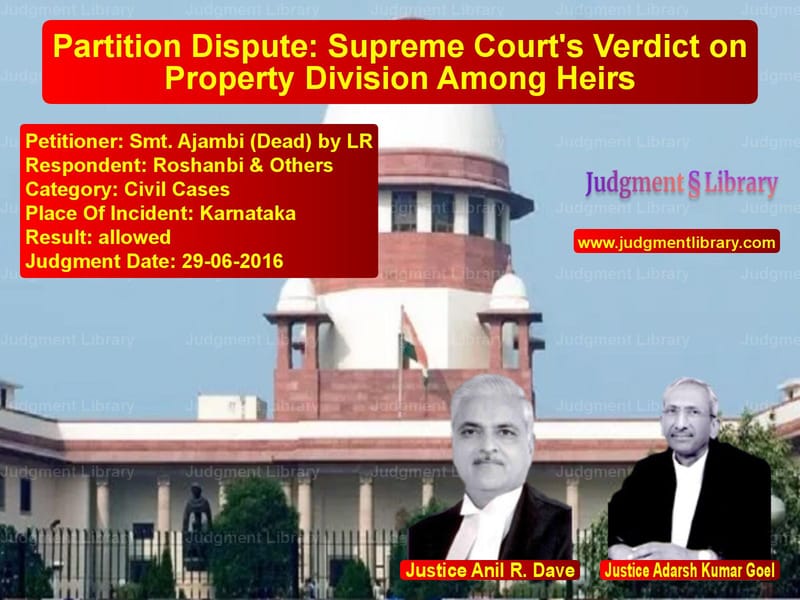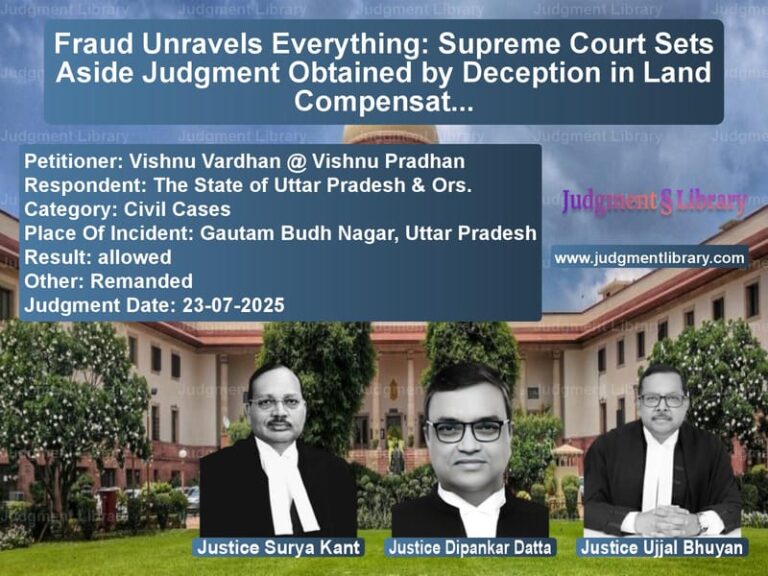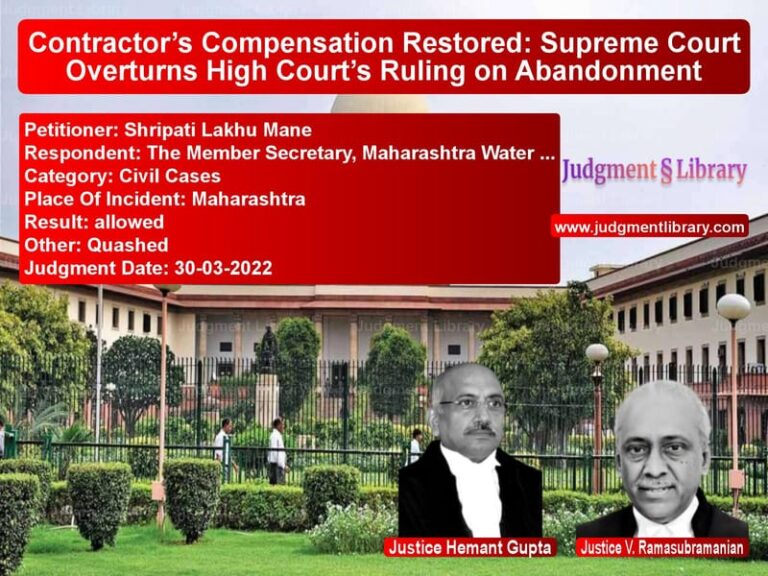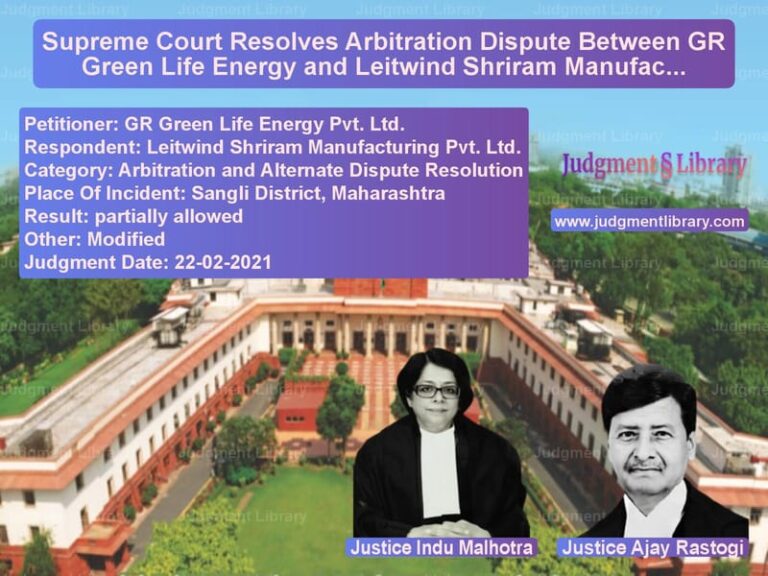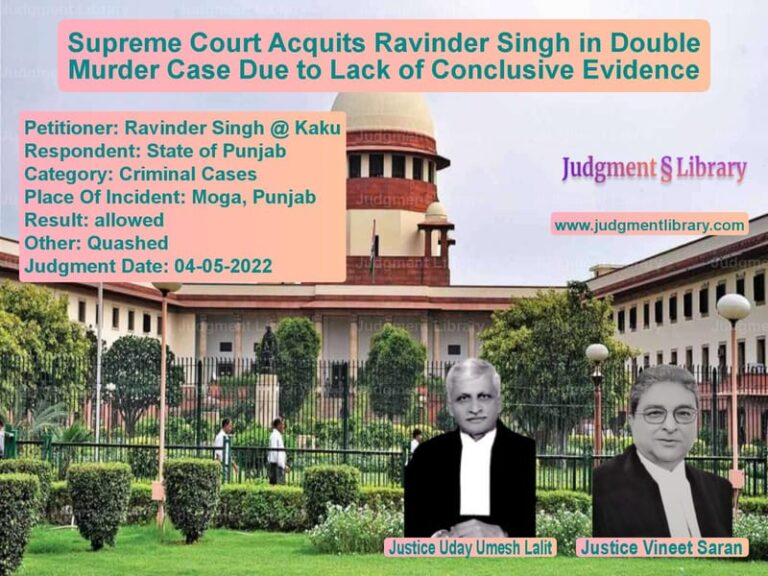Partition Dispute: Supreme Court’s Verdict on Property Division Among Heirs
The Supreme Court of India recently delivered a judgment in Civil Appeal No.7237 of 2010, where the core issue revolved around a partition dispute among the heirs of late Shaikaji. This case was originally filed by Roshanbi and Others seeking separate possession and partition of the property left behind by late Shaikaji. The appellant, Smt. Ajambi, was the legal representative of one of the deceased parties in the case.
Background of the Case
The dispute was about a property initially owned by late Shaikaji, who was married twice. His first wife, Halimabi, had two children, one of whom had passed away. His second wife, Roshanbi, had six children. The plaintiffs (Roshanbi and her children) filed a suit claiming a 7/8th share in the disputed property, while the defendant, the heir of the first wife, contested the claim.
Litigation Journey
- Trial Court: The plaintiffs succeeded in their claim, and the suit was decreed in their favor on July 27, 1988.
- First Appellate Court: The defendant challenged the decision, but the appeal was dismissed on November 13, 1995.
- High Court of Karnataka: The defendant pursued another appeal in the High Court, which allowed the appeal and remanded the case back to the First Appellate Court.
- First Appellate Court (Post-Remand): Upon reconsideration, the court relied on a partition memorandum dated August 12, 1958 (Ex.D7) and ruled in favor of the defendant, concluding that the property had already been divided during late Shaikaji’s lifetime.
- Second Appeal in High Court: The plaintiffs challenged this ruling, and the High Court reversed the decision, setting aside the partition memorandum on the ground that it was unregistered and inadmissible.
- Supreme Court: The final appeal was filed before the Supreme Court, which overturned the High Court’s decision and restored the ruling of the First Appellate Court.
Key Issues Examined by the Supreme Court
- Validity of Ex.D7 (Partition Memorandum): The Supreme Court ruled that the document was admissible despite the High Court’s assertion that it required registration.
- Possession and Revenue Records: The division of property was reflected in official records as two distinct properties—CTS No.883/A and CTS No.883/B—corroborating the partition.
- Concept of Joint Family in Muslim Law: The High Court had dismissed the partition claim, arguing that Islamic law does not recognize joint family property. However, the Supreme Court clarified that an individual can distribute property voluntarily during their lifetime.
Supreme Court’s Observations
Justice Anil R. Dave and Justice Adarsh Kumar Goel ruled in favor of the defendant, making the following key observations:
“It is true that there is no concept of joint family in Muslims, but it was open to late Shaikaji to give his property to his children in a particular manner during his lifetime, which he rightly did, so as to avoid any dispute which could have arisen after his death.”
“The document Ex.D7, though presented after 30 years, was admissible under the provisions of the Indian Evidence Act, and there was no reason to disbelieve the said document.”
Conclusion
The Supreme Court set aside the Karnataka High Court’s ruling and upheld the First Appellate Court’s decision that recognized the partition agreement of 1958. This judgment reinforces that property owners have the right to divide and distribute their assets during their lifetime, and such arrangements, even if recorded informally, can be legally valid.
Final Verdict
- The appeal was allowed, and the High Court’s ruling was overturned.
- The partition agreement (Ex.D7) was deemed valid and enforceable.
- The plaintiffs were not entitled to 7/8th share in the property.
- The judgment reaffirmed that documentary evidence reflecting property division, even if unregistered, can be relied upon if it has been acted upon.
This case highlights the importance of maintaining clear documentation and ensuring timely legal action in property disputes.
Don’t miss out on the full details! Download the complete judgment in PDF format below and gain valuable insights instantly!
Download Judgment: Smt. Ajambi (Dead) b vs Roshanbi & Others Supreme Court of India Judgment Dated 29-06-2016-1741872379923.pdf
Direct Downlaod Judgment: Direct downlaod this Judgment
See all petitions in Property Disputes
See all petitions in Succession and Wills
See all petitions in Landlord-Tenant Disputes
See all petitions in Judgment by Anil R. Dave
See all petitions in Judgment by Adarsh Kumar Goel
See all petitions in allowed
See all petitions in supreme court of India judgments June 2016
See all petitions in 2016 judgments
See all posts in Civil Cases Category
See all allowed petitions in Civil Cases Category
See all Dismissed petitions in Civil Cases Category
See all partially allowed petitions in Civil Cases Category

